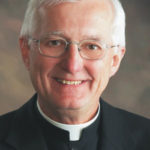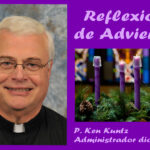By Patrick Schmadeke
Theology informs every area of life. It knows no boundaries.

In the early days of the pandemic, all of my classes had switched to online instruction and we had pulled our son, Matthew, from daycare. Like everyone else, life for us changed overnight. My daily routine switched from that of a full-time graduate student to that of a full-time, stay-at-home dad. The days were full of walks, reading and play and I squeezed in studying during naptime and reading assignments during the late night and early mornings.
One day during class, in the midst of a light-hearted conversation, my sacramental theology professor offered a challenge to me to write a theology of toy trucks. In laughter, I responded that someday I would. It has taken some time to sort out why and how toy trucks might be the subject of theological reflection.
I’ll begin by calling attention to the fact that our 4-year-old son plays with his toy trucks in a variety of ways. Sometimes there is construction in the form of a stack of blocks. Other times there is deconstruction, usually of the stack of blocks just constructed. This is all in good fun. What he does with his toy truck is a product of, and formative of, his imagination. When we are on the floor playing together, we engage in a continual exchange of ideas, a dynamic interaction of mutual imagining. Sounds and actions all unfold in an improvisational manner.
This leads to many questions: are all forms of playing with trucks equal? Are there better and worse ways to play with trucks? If so, how should we play with the trucks? Do we take into account the desires of the other person? Is it with consideration of what the other person has built or wants to build? Sometimes, playing with trucks is an occasion to train a discipline in gentle play when the temptation is to play in too wild a manner. These kinds of questions concern largely an ethic of playing with toy trucks.
A theology of playing with toy trucks considers a wider horizon of relationships and relationship building. “For where two or three gather in my name, there I am with them” (Matthew 18:20). With an eye towards theology, playing with trucks involves an awareness that our play honors God. When play is in a mode of mutuality and kinship, there are signs of the Trinity. Yes, play can be, in its own way, a manifestation of the Trinity.
Furthermore, play is less an action that we perform than it is an event in which we participate and are shaped by. Continual play can be character and imagination forming. This is not a pious platitude, our play honors God and one another.
From the quotidian to the epic, there is a theology of any and all things. We each, in our daily lives, often operate as if this is the case. Perhaps most often, this occurs on a subconscious level. We know we are doing these things well when our activities promote growth in relationship.
(Patrick Schmadeke is Director of Evangelization for the Diocese of Davenport.)











